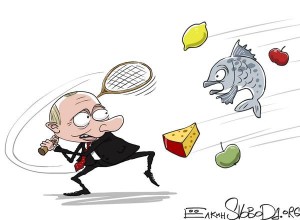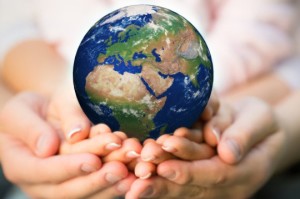 In June the EU extended economic sanctions against some Russian companies and individuals for another six months. These economic sanctions were introduced in response to the annexation of Crimea by Russia and its support of separatists in the South-East Ukraine. A few days later Kremlin extended its embargo on import of European and American food to Russia.
In June the EU extended economic sanctions against some Russian companies and individuals for another six months. These economic sanctions were introduced in response to the annexation of Crimea by Russia and its support of separatists in the South-East Ukraine. A few days later Kremlin extended its embargo on import of European and American food to Russia.
It would seem that there is nothing surprising in this situation: the sanctions and embargo terms stayed the same, and only their length has been extended. But, as they say, the devil is in details.
Since August of last year, Russian dairy producers and the officials who are supporting them raised the issue of banning imports of lactose-free products. Ostensibly, dairy products, which fall under the embargo, are being imported to Russia under the guise of lactose-free products. This lobby has been successful and the importation of lactose-free products became extremely complicated. Now importers must obtain special permits confirming that imported products are lactose-free and there are no domestic substitutes.
Most citizens of the country are indifferent to this news. Only 15-18 percent of the Russian population has intolerance for lactose. Moreover, since almost all lactose-free products are imported, the price of them is high. Therefore, such products can be bought only in major cities, especially in supermarket chains. So the main consumers of lactose-free products are residents of the big cities with above-average income. Generally, these are families with a higher level of education, the most economically active segment of the population.
Apparently, Kremlin feels no need to consider the interests of such a small group of the country’s population. The authorities have once again sent educated and economically active Russians an unequivocal message: “We do not care about your problems.” If it is necessary for them to consume lactose-free products, access to which is now banned, they will have to change their lives to avoid exposing themselves and their children to allergic reaction to lactose. They may well move to a country where they can buy lactose-free products in any supermarket.
Together with other actions of Kremlin, the grocery embargo promotes a new wave of emigration. This is confirmed by official statistics: Russians are leaving mainly for EU countries, USA and Canada, but people do not leave because they see great prospects abroad. The percentage of unemployed in the US is approximately the same as in Russia, and it is much higher in some European countries. Adding in the difficulties in adapting to a new life in a foreign country (different language, laws,  traditions, etc.), it can be a disappointing conclusion for the Russian authorities: people are not leaving for something good, they are going away from something bad. The reasons for emigration include not only the lack of products which became customary but are not produced in Russia and not imported into the country anymore. More generally, there are no economic prospects, and living standards are visibly falling. As a result, the most determined and well-educated people are leaving the country, those whom Russia needs the most. Kremlin apparently is not concerned. Putin’s regime has long been reminiscent of the Soviet era of Leonid Brezhnev’s time when people could use food stamps to get a limited range of products while political establishment could acquire a wide range of products in closed distribution chains. Putin knows how to act in a condition of a global deficit: special permits, special stores, special cards and other “special” essential attributes of the Soviet system. Those who do not like it can leave the country. The borders are open, for now.
traditions, etc.), it can be a disappointing conclusion for the Russian authorities: people are not leaving for something good, they are going away from something bad. The reasons for emigration include not only the lack of products which became customary but are not produced in Russia and not imported into the country anymore. More generally, there are no economic prospects, and living standards are visibly falling. As a result, the most determined and well-educated people are leaving the country, those whom Russia needs the most. Kremlin apparently is not concerned. Putin’s regime has long been reminiscent of the Soviet era of Leonid Brezhnev’s time when people could use food stamps to get a limited range of products while political establishment could acquire a wide range of products in closed distribution chains. Putin knows how to act in a condition of a global deficit: special permits, special stores, special cards and other “special” essential attributes of the Soviet system. Those who do not like it can leave the country. The borders are open, for now.





